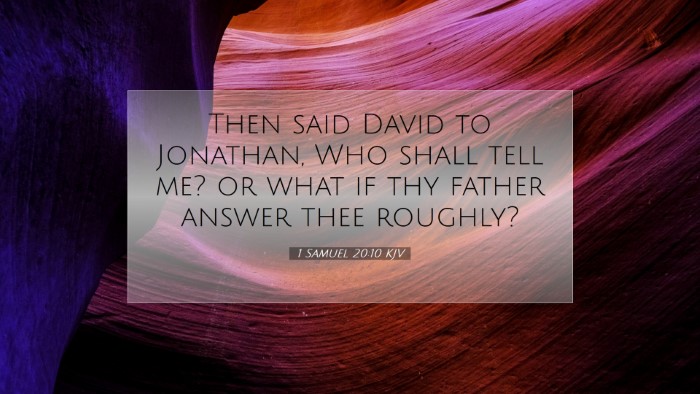Commentary on 1 Samuel 20:10
1 Samuel 20:10 states: "Then said David to Jonathan, Who shall tell me? or what if thy father answer thee roughly?" This verse captures a moment of deep concern between two friends, David and Jonathan, as they navigate the dangers posed by Saul's increasing hostility. The relationship serves as a profound narrative device that reflects themes of loyalty, friendship, and divine providence.
Context and Background
The passage occurs within a tense backdrop, highlighting Saul’s envy and animosity towards David, who was recently anointed by Samuel as the future king of Israel. David, aware of Saul's intentions, seeks to understand the extent of his father’s wrath through Jonathan, his close friend and Saul’s son.
Insights from Commentaries
-
Matthew Henry's Commentary
Matthew Henry emphasizes the gravity of David's situation in the royal court, where he finds himself threatened by Saul's jealousy. He notes that David's question to Jonathan reflects a sense of vulnerability and the need for assurance amid uncertainty. Henry points out that David's trust in Jonathan showcases the beauty of their friendship, forged amid political strife. He writes, "True friendship is a great blessing; it gives counsel and succor in times of distress."
-
Albert Barnes' Notes on the Bible
Albert Barnes delves into the emotional turmoil experienced by David. He explains that David's inquiry is not just about seeking information but is indicative of his deep reliance on Jonathan. Barnes highlights the essence of communication and transparency in friendships, suggesting that David's question underscores the necessity for clarity to navigate treachery and potential betrayal in their environment. He observes that "David's dependence on Jonathan reflects a profound truth about the necessity of mutual support in times of peril."
-
Adam Clarke's Commentary
Adam Clarke focuses on the interactions between David and Jonathan, interpreting David's fears as symbolic of those in positions of power. Clarke asserts that David’s fear of Saul's reaction symbolizes larger themes of authority and the enigmatic nature of leadership. His commentary suggests that this verse illustrates the significance of discernment when facing authority: "In moments of uncertainty, even the brave can feel fear; it is wisdom to seek counsel from those we trust."
Theological Reflections
This verse not only serves as a narrative pivot but also provides a fertile ground for theological reflection. The relational dynamics between David and Jonathan echo the importance of faithful companionship within the Christian framework. The essence of friendships that foster spiritual warfare is highlighted here; Jonathan's role signifies the ideal of being 'iron sharpens iron' (Proverbs 27:17).
Applications for Modern Believers
- Embrace Vulnerability: Just as David reached out to Jonathan for guidance, believers are encouraged to seek counsel and share their fears with trusted friends or mentors.
- Value of True Companionship: Modern Christians must cultivate deep relationships reminiscent of David and Jonathan, which provide support, prayer, and accountability.
- Wisdom in Communication: Conveying concerns in the face of adversity is essential. Like David, believers should not shy away from conveying their uncertainties to friends and loved ones.
- Trust in God’s Plan: Even amid turmoil, David’s reliance on Jonathan demonstrates a greater trust in God’s sovereign plan, reminding believers to hold fast to their faith despite challenges.
Conclusion
1 Samuel 20:10 serves as a poignant reminder of the complexities of human relationships set against the backdrop of divine providence. It invites pastors, students, and theologians to reflect on the interplay of fear, faith, and friendship, ultimately leading to a deeper understanding of how God weaves people into our lives to guide and support us in our journeys. In essence, navigating threat and uncertainty with spiritual companions rooted in faith can fortify the soul against the trials of life.


